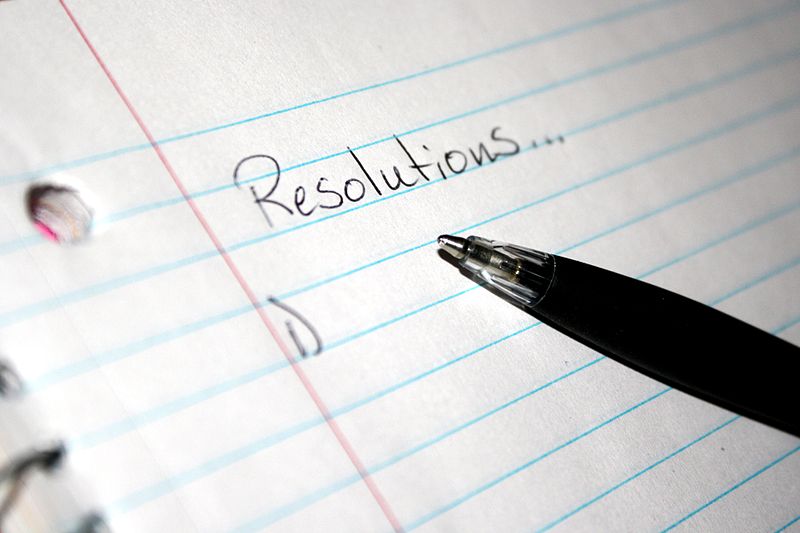
2
While nearly everyone aspires to better health, it’s not a secret that most health-related New Year’s resolutions are unsuccessful. We have the tendency to create resolutions that are too difficult or too complex—all in the name of achieving quick, extreme results.
But rather than trying for the quick fix, the new year is an opportunity to establish lifestyle modifications that are simple and easy to sustain—so that after some time they come to be habits, slowly but surely getting you nearer to optimal health.
Here are five simple resolutions you can implement right now for a healthy 2016.
1. Develop a new health mindset
It’s a recognizable story: you start the latest fad diet and you’re feeling pretty good. Then, a few weeks into the program, and you have a birthday party to go to. You show up determined to be accountable, but you can’t refrain from the cake and ice cream. Diet over.
Quiting in this fashion is a symptom of an all-or-nothing attitude to diet and health. In the place of giving up when you cheat on your diet, imagine your current level of health as resting at one point along a continuum. Every decision you make pushes you nearer to one end (good health) or the other end (poor health).
The cake and ice cream moved you to the wrong end of the continuum, but that doesn’t indicate that you need to move in the same direction for the remainder of the day, week, or month. It’s OK to have that piece of cake once in a while, so long as the greater part of your decisions move you towards better health.
Creating healthy habits demands a short memory. You will slip-up every so often. What counts is your response, and how you’ll work toward making more healthy than unhealthy decisions moving forward.
2. Establish a moderate, well-balanced diet
Fad diets almost never succeed. The reality is that they are unsustainable, which means that even if they do work in the short-term, you’ll likely just regain the weight.
Fad diets are all about deprivation of some type. No carbs, no fats, only 1,000 calories each day. It’s like if I suggested that you’d be more productive at the office if you didn’t check your email for a month. In the course of that month, you would most likely get a lot more work done.
But what would happen at the end of the month? You’d consume the majority of your time reading through emails, catching up, and losing all the productivity you had achieved.
The same phenomenon applies to deprivation diets. In fact, studies show that individuals tend to gain more weight back than they shed after the conclusion of a temporary fad diet.
So what’s the remedy?
Moderation. Remember the health continuum? It’s okay to have a bag of chips or a cheeseburger once in awhile. Individual foods are not important—your overall diet is what’s important. As long as most of your decisions are healthy, you’re moving down the continuum in the right direction.
3. Incorporate exercise into your daily routine
If you want to write a novel, and you make yourself to write the entire thing in one sitting, you’ll never make it to the end. But, if you commit to writing one page per day, you’ll have 365 pages to work with at the end of the year.
Everyone knows they should be working out. The issue is the same as with fad diets: the adoption of an all-or-nothing mentality. You purchase a gym membership and pledge to devote to 7 days a week, three hours a day, for the rest of your life. Two weeks in, you miss a few days, deactivate your membership, and never return.
All or nothing. You’re focused on the days you skip going to the gym when you should be focusing on the times you do go to the gym. Every gym trip moves you closer on the continuum to good health.
You can likewise combine physical exercise at work and elsewhere during the day. Choose the stairs in the place of the elevator, park your car farther away from the store entrance, do some pushups on your lunch break. Each one of these activities tip the balance to good health.
4. Lower stress
There are primarily three ways to cope with stress:
- Eliminate the source of your stress, if possible
- Reframe the stress into something beneficial
- Engage in relaxing activities more often
This will be different for everyone, but here’s an example of a resolution making use of all three methods.
Eliminate – certain activities and obligations produce more stress relative to the benefits acquired. If you find, for example, that you spend most of your time on social media, but the stress of updating your status offers little reward, you might consider ditching your accounts.
Reframe – Have you ever noticed that the same experience can be stressful for one person, yet stimulating for another? For instance, some people loathe public speaking while others cherish it. It is possible, but not easy, to reframe your feelings of anxiety into positive energy you can use to conquer your fears.
Relax – What do you love doing the most? What is most relaxing to you? Listening to music? Reading? Hiking? Meditating? Whatever it is, find ways to open your schedule to do more of it and the stress will disappear.
5. Schedule routine hearing tests
And finally, think about committing to a hearing exam this year. While this may sound insignificant, it’s not—one out of 5 people in the US suffers from some degree of hearing loss and most do nothing about it.
Hearing loss is linked to several serious medical conditions, including depression, cognitive decline, and even dementia. Not to mention the continuous struggle to hear as a major source of stress.
Improving your hearing is an excellent way to minimize stress, strengthen personal relationships, and improve your all-around health and well-being.